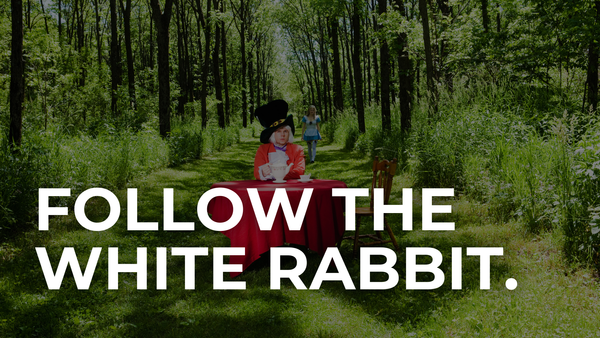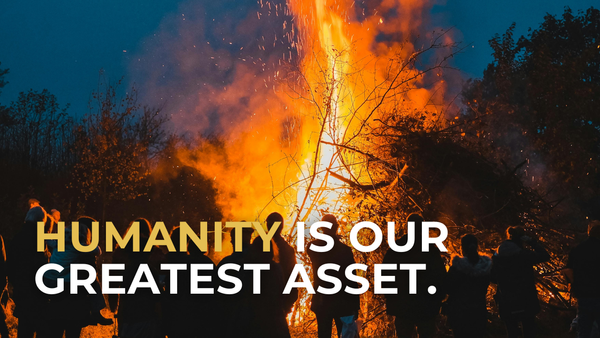I'm writing this from my office / hobby room / art studio / gym / music listening space / gaming room.
I'm using my work / gaming computer.
This newsletter is my outlet / vehicle for change / way of connecting with you.
Everything in my life is a something / something else. This is the reality of living with a mind that sees patterns and connections as if they were things.
I see the interconnectedness of everything as the essence of it. The root of it. The core of it. The truth of it.
I see the actual things as secondary to their connections.
Maybe you do, too.
This is often the way pattern recognition works in neurodivergent brains. The connections jump out to us, grabbing our attention and shouting for us to follow and see where they go.
Like Alice following the white rabbit, down we go, following our curiosity.
"Curiouser and curiouser!" we mutter to ourselves, following the path through the strange, into the bizarre, and finally to wonder.
Not without a sense of urgency, of course. Our curiosity checks it's stopwatch, reminding us that we're "late! I'm late! For a very important date! No time to say 'Hello, goodbye!' I'm late! I'm late! I'm late!"
If we had learned, as children, how to balance our time in Wonderland with other ways of thinking and being, things would be very different for us as adults.
But instead, we were taught that Wonderland - following our curiosity, thinking in patterns and connections - was child-like, irresponsible, and in some cases just plain wrong.
We were only taught the tools of linear thinking and top-down processing.
This is all they teach in school, for the most part.
Think of your big goal, and break it down into projects, then sections, then tasks, then steps.
Do things in order (and there is always a correct order.)
Chronological and alphabetical are the best forms of organization. Etcetera into infinity.
This causes at least two problems:
- We have additional, invisible cognitive labour.
Most accessibility tools and accommodations for ND folx have tried to make neurotypical thinking accessible to us ...
... rather than supporting neurodivergent thinking.
We were taught how to follow the details up to the top so that we could plan things top-down.
We were taught how to spot the patterns and compile the info so that we could organize it in a linear way.
We were taught how to create to-do lists and focus supports so that we could rapidly change tasks (polytropic focus.)
(FYI, this is also why a lot of ND folx make great project managers. We're fantastic at using these tools consciously because we've had to learn how to do the cognitive process of breaking it down and reorganizing our thoughts.)
This results in every plan, every task, every thing that we do requiring additional, invisible labour to organize our thoughts and then use the tools. - We don't trust ourselves.
As children, the adults in our lives - teachers, parents, librarians, textbooks - tell us that we're doing it wrong.
"Show your work," they'll say.
"That's not what the author meant," you're told.
"You must have cheated," we hear when we succeed, and they didn't expect it.
"We don't do that until next year," you hear when you have an interest.
So we learn to stop listening to ourselves and our ways of thinking, and start listening to the adults who know better. I mean, they're adults! They must know better! I'm just a kid, or so they keep reminding me.
Now, at 38 years old, I still look for the adult to tell me what to do. To give me permission to do things my way.
I still overexplain to authorities so they'll understand and approve.
Instead of parents, teachers, and textbooks, it's coaches, consultants, workshops, and seminars...
But I'm still just looking for an adult to tell me what to do, because my brain cannot be trusted.
And so, over time, we lose access to Wonderland.
We dismiss it as irresponsible, unproductive, the fanciful byproduct of childhood imagination.
Losing yourself in daydreams and making art isn't very participant in capitalism of you, is it?
Spending hours or days lost in solving a mystery isn't very productive worker of you, right?
Doing the things that interest you, no matter their potential, isn't very selfless caregiver of you, correct?
We set aside the rabbit holes, set down the dopamine-fueled investigations, and ignore the expertise we've crafted through thousands of interconnected explorations.
Except when we don't.
All bets are off when we finally allow ourselves to follow the dopamine, right? When we finally go down the rabbit hole, pursue the interest, embrace the creativity, when there is no one left to tell us "no", we just do the thing and achieve all our goals! Right?
No. No, that is not how it works.
Because the biggest loss of this isn't the things we could be creating, or the trauma (but my goodness, the trauma), or the extra mental energy it takes for us to do everything, or the invalidating way we're still spoken about in society.
No, the biggest loss is that we never learned how to think our way well.
No one ever taught us the models for bottom-up thinking that aren't just "follow it to the top so you can do it our way."
No one ever taught us how to use pattern recognition and contextual clues to discover meaningful things and then present our observations as valid.
No one ever showed us how to test our white rabbits to learn if they're just interesting, or incredibly valuable.
No one ever taught us how to use the ways that we think to actually achieve something worthwhile.
At best, we get to follow our genius and our dopamine into an interest for a short time, and then fall back on the systems we were given for brains that are not like ours and we have to make this thing that used to be so fun and interesting fit.
At worst? We don't follow our interests at all. We listen to the "adults" (bosses, coaches, workshops, book) that tell us not to do those things. We trust them more than we trust ourselves.
One of my major goals, professionally, has been to solve this problem.
To build, expand on, improve and share ways of bottom-up thinking and planning, supports for monotropic focus, frameworks for pattern-based processing that can help us learn to use the way we actually think.
Not, "here's a planning system that shows you how to follow the steps up to the big picture, and then plan from the top down."
But instead, "here's a bottom-up planning system."
I've been using a bottom-up planning system for over a decade.
Long before I knew what a bottom-up planning system even was, or that my brain did bottom-up thinking, I was using this process to plan every year in my business.
When I had been planning "top-down", my annual plans were basically wishlists with superhuman task lists.
Project One: Make a million dollars!
Q1: Come up with an idea
Q2: Find a million people
Q3: Sell them my idea for $1
Q4: Vacation
Maybe they weren't always quite so delusional, but let's be real. Even the ones that seemed grounded in reality? They usually consisted of "goals" that were wants or dreams, plucked out of thin air, and broken down into projects and tasks.
So yeah. They basically failed every single time.
My bottom-up planning method?
I've achieved 80% of my goals every year that I've used it.
A few years ago, I documented the full method for "Unplanning" in a workshop. It got so many amazing reviews, I did it again the next year.
If you want to use my Unplanning process for 2026, there are currently two ways you can do this:
- One-on-one with me. Last night, I made five one-on-one Unplanning sessions with me available to my members. There are now three left. The last time I offered these, they sold out within 48 hours.
We'll spend 90 minutes together, and you'll walk away with a full two-page plan for your entire year - bottom-up style. I've made this as accessible as I can. It is "a dollar a day" - $365 USD to plan with me in November.
Details and booking information here. If there are no dates or times available, they are sold out. - Self-study style with the workshop replays. I will be turning this into a self-study course in the next few months, complete with fill-in-the-blanks tools that can reflect your information back to you and assist you in the process.
For now, there are two replays and a full workbook to take you through the process. These are available for $222, and you'll be able to access the workshop replays and the course for the lifetime of Solo School.
You can register for the course and workshop replays here.
Whether you choose to plan with me, with my process, or not at all, I hope you spend more time in 2026 learning how to work with your ways of thinking.
I hope you see how brilliant you can be when you're supported.
I hope that we continue to find ways to support neurodivergent thinking directly, rather than simply helping it look like neurotypical thinking.
We can't fix everything. But maybe together, if we're supported, what we can do is enough.
- Cheryl



